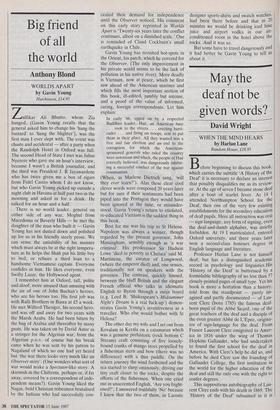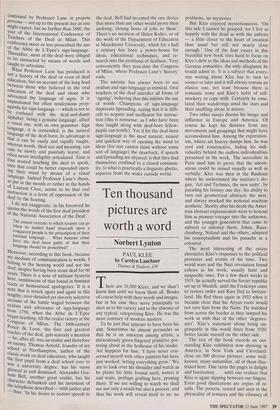May the deaf not be given words?
David Wright
WHEN THE MIND HEARS by Harlan Lane
Random House, f18.95
Before beginning to discuss this book, which carries the subtitle 'A History of the Deaf' it is necessary to declare an interest that possibly disqualifies me as its review- er. At the age of seven I became stone deaf after a bout of scarlet fever. At 14 1 attended Northampton School for the Deaf, then one of the very few existing establishments for the secondary education of deaf pupils. Here all instruction was oral — sign language, any form of signing, even the deaf-and-dumb alphabet, was strictly forbidden. At 19 I matriculated, entered Oxford university, and three years later won a second-class honours degree in English language and literature. Professor Harlan Lane is not himself deaf, but has a distinguished academic record in psychology and linguistics.His 'History of the Deaf is buttressed by a formidable bibliography of no less than 57 closely-printed pages of small type. Yet his book is more a hortation than a history, told from the standpoint — partly im- agined and partly documented — of Lau- rent Clerc (born 1785) the famous deaf- born pupil of the Abbe Sicard, one of the great teachers of the deaf and a disciple of the even greater Abbe de L'Epee, origina- tor of sign-language for the deaf. From France Laurent Clerc emigrated to Amer- ica in 1816 under the wing of Thomas Hopkins Gallaudet, who had undertaken to found the first school for the deaf in America. With Clerc's help he did so, and before he died Clerc saw the founding of Gallaudet College, the first institution in the world for the higher education of the deaf and still the only one with the right to confer degrees.
This suppositious autobiography of Lau- rent Clerc ends with his death in 1869. The 'History of the Deaf subsumed in it is
continued by Professor Lane in propria persona — not up to the present day as one might expect, but no further than 1880, the year of the International Conference of Teachers of the Deaf at Milan. This conference more or less proscribed the use of the Abbe de L'Epee's sign-language. Thereafter, most of the deaf were obliged to be instructed by means of words and taught to articulate.
What Professor Lane has produced is not a history of the deaf or even of deaf education, but an account of the long feud between those who believed in the oral education of the deaf and those who advocated the language of signs. It is impassioned but often tendentious prop- aganda for sign-language — which is not to be confused with the deaf-and-dumb alphabet, being a genuine language, albeit a visual one, with its own grammar. Sign language, it is contended, is the natural language of the deaf-born; its advantage is that it can be easily and rapidly taught, whereas words, their use and meaning, can only be slowly and painfully learnt, and often never intelligibly articulated. Time is thus wasted teaching the deaf to speak, time that could be better expended open- ing their mind by means of a visual language. Indeed Professor Lane's thesis, as put in the mouth or rather in the hands of Laurent Clerc, seems to be that oral instruction is a form of oppression of the deaf by the hearing. I do not exaggerate: in his foreword he quotes the words of the first deaf president of the National Association of the Deaf:
The utmost extreme to which tyranny can go when its mailed hand descends upon a conquered people is the proscription of their national language. . . What heinous crime have the deaf been guilty of that their language should be proscribed?
Moreover, according to this book, because my medium of communication is words, I belong to the hearing world and not the deaf, despite having been stone deaf for 60 Years. There is a note of militant hysteria here, reminiscent of that found in feminist tracts or homosexual apologetics. It is a note that is struck again and again in this lengthy, over-detailed yet cleverly selective account of the battle waged between the oralists and advocates of sign-language from 1750, when the Abbe de L'Epee began teaching, till the oralist victory at the Congress of Milan. The 16th-century Ponce de Leon, the first and greatest teacher of the deaf, gets scarcely a mention — he, after all, was an oralist and therefore an enemy. Thomas Arnold, founder of my school at Northampton, author of the classic work on deaf education, who taught the first pupil from a deaf school ever to win a university degree, has his views glanced at and dismissed. Alexander Gra- ham Bell, another great oralist, has his character debunked and his invention of the telephone described — with justice alas thus: 'In his desire to restore speech to the deaf, Bell had invented the one device that more than any other would prove their undoing, closing hosts of jobs to them'. There's no mention of Helen Keller, or of the work of the Department of Education at Manchester University, which for a half a century has been a power-house for ideas, educational techniques, and re- search into the problems of deafness. Very conveniently they post-date the Congress of Milan, where Professor Lane's 'history' ends.
The mistake has always been to see oralism and sign-language as inimical. Oral teachers of the deaf interdict all forms of 'signing', believing that this inhibits the use of words. Champions of sign-language deprecate lipreading, saying that it is diffi- cult to acquire and inefficient for instruc- tion (this is nonsense, as I who have been thus taught along with deaf-born fellow- pupils can testify). Yet if for the deaf-born sign-language is the most natural, easiest and quickest way of opening the mind to ideas (for one cannot think without some sort of language) the drawback, if speech and lipreading are abjured, is that they find themselves confined to a closed commun- ity, to what is practically a linguistic ghetto, separate from the wider outside world.




























































 Previous page
Previous page